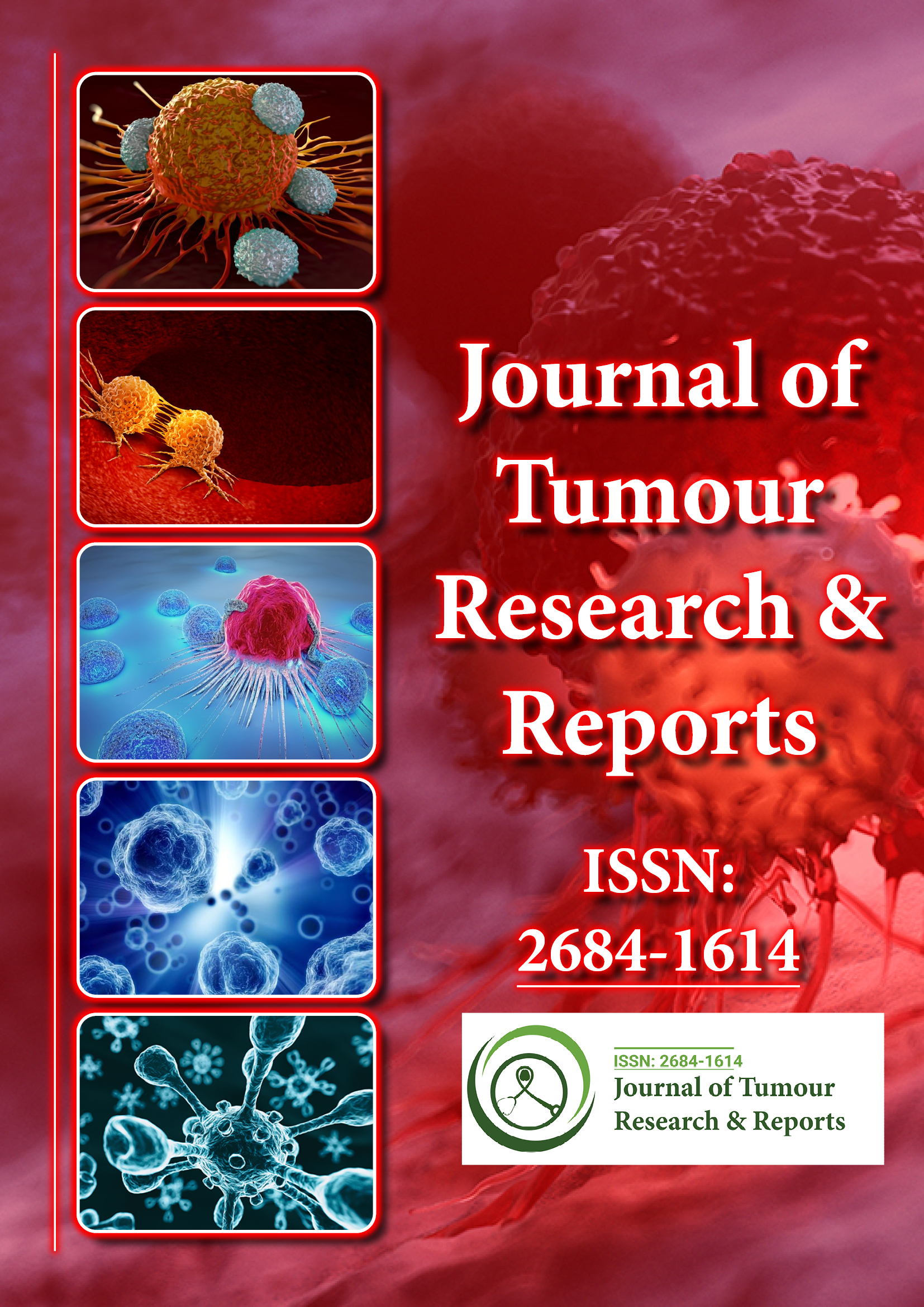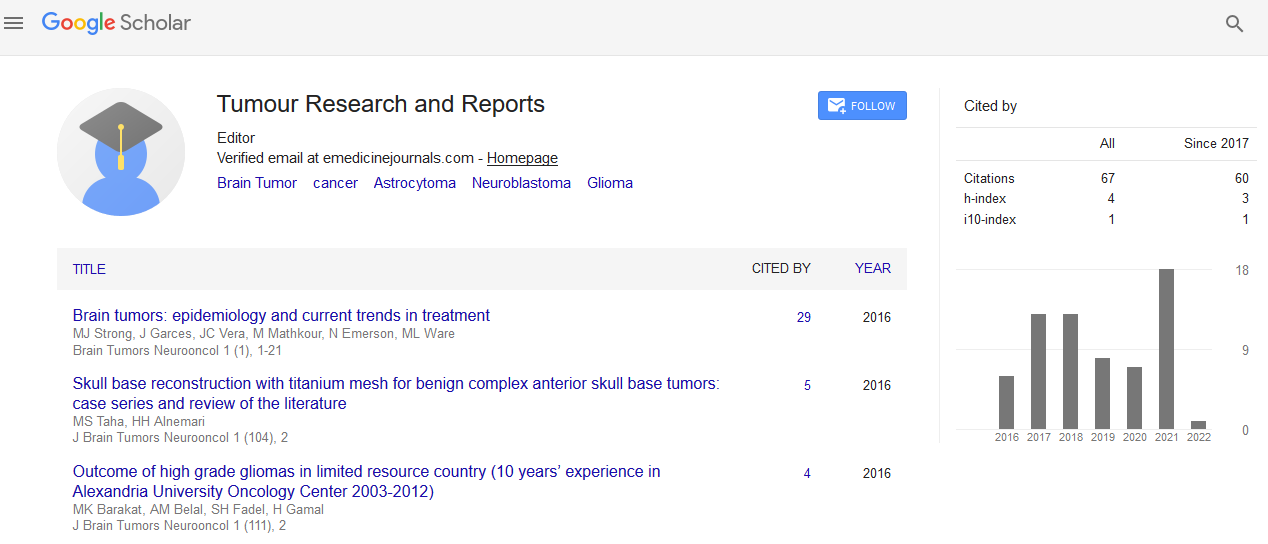Indexed In
- RefSeek
- Hamdard University
- EBSCO A-Z
- Google Scholar
Useful Links
Share This Page
Journal Flyer

Open Access Journals
- Agri and Aquaculture
- Biochemistry
- Bioinformatics & Systems Biology
- Business & Management
- Chemistry
- Clinical Sciences
- Engineering
- Food & Nutrition
- General Science
- Genetics & Molecular Biology
- Immunology & Microbiology
- Medical Sciences
- Neuroscience & Psychology
- Nursing & Health Care
- Pharmaceutical Sciences
Short Communication - (2024) Volume 9, Issue 3
The Impact of Hormone Replacement Therapy in Radiation-Induced Premature Ovarian Insufficiency
Taunk Megan*Received: 30-Aug-2024, Manuscript No. TRR-24-27828; Editor assigned: 02-Sep-2024, Pre QC No. TRR-24-27828; Reviewed: 16-Sep-2024, QC No. TRR-24-27828; Revised: 23-Sep-2024, Manuscript No. TRR-24-27828; Published: 30-Sep-2024, DOI: 10.35248/2684-1614.24.9.238
Description
Radiation therapy is a key treatment for various malignancies, particularly in pediatric and young adult populations. While effective in treating cancers, radiation, especially when directed at pelvic or abdominal regions, can lead to a range of adverse effects on reproductive health. One of the most significant consequences is radiation-induced Premature Ovarian Insufficiency (POI), a condition characterized by the loss of ovarian function before the age of 40. This condition is often associated with infertility, menopausal symptoms and an increased risk of long-term health complications. Hormone Replacement Therapy (HRT) has emerged as a potential strategy to mitigate these effects and improve the quality of life for women suffering from radiationinduced POI. This article examines the impact of HRT in managing radiation-induced premature ovarian insufficiency and the associated challenges and benefits [1-3].
Radiation therapy can damage the ovaries by affecting the primordial follicles, which are responsible for female fertility. The ovaries are particularly sensitive to ionizing radiation, with the degree of damage depending on factors such as the radiation dose, the specific area targeted and the age at the time of exposure. In general, higher doses of radiation result in more significant damage to ovarian tissue, leading to a decline in ovarian reserve and the onset of POI. Clinically, this manifests as irregular or absent menstrual cycles, elevated gonadotropin levels and low estrogen levels. The early onset of menopause due to radiation-induced POI can significantly impact reproductive and endocrine health, leading to infertility, cardiovascular risks, osteoporosis and cognitive impairments [4,5].
Hormone replacement therapy aims to alleviate the endocrine deficiencies caused by POI, particularly the lack of estrogen and progesterone. For women with radiation-induced POI, HRT has several key benefits. The abrupt loss of ovarian hormones in POI leads to symptoms such as hot flashes, night sweats, mood swings and vaginal dryness. These symptoms can severely affect the quality of life. HRT, particularly estrogen therapy (with or without progesterone), can effectively alleviate these symptoms by restoring hormone levels to normal or near-normal levels.
Estrogen plays a critical role in maintaining bone density. Women with POI are at increased risk for osteoporosis and fractures due to the premature decline in estrogen. By using HRT, the risk of bone loss can be mitigated and bone mineral density can be preserved. In fact, early initiation of HRT after the onset of POI is recommended to optimize bone health and prevent long-term complications such as fractures. Estrogen has a protective effect on the cardiovascular system. In women with POI, the lack of estrogen increases the risk of cardiovascular diseases, such as atherosclerosis and coronary artery disease. HRT, especially when started early, may offer protective benefits, although the long-term cardiovascular benefits of HRT in women with radiation-induced POI remain an area of ongoing research.
One of the most critical concerns for young women with radiation-induced POI is infertility. While HRT does not restore ovarian function or fertility, it can play a role in fertility preservation strategies. In some cases, HRT is used in conjunction with other reproductive technologies like egg freezing or embryo cryopreservation before undergoing radiation therapy. The timing of HRT initiation is important. Starting HRT as soon as POI is diagnosed is essential to optimize health outcomes, particularly for bone density and cardiovascular health. However, the timing of treatment may depend on the specific type of cancer, the radiation dose and the patient’s overall health [6-8].
While HRT can be beneficial for alleviating the symptoms of POI, its long-term safety remains a concern. Some studies suggest a potential increased risk of breast cancer with prolonged estrogen exposure, especially in women with a history of hormone-sensitive cancers. Therefore, the use of HRT in this population requires careful monitoring and individualized treatment plans should be developed in collaboration with oncologists and endocrinologists. Not all women with radiation-induced POI will respond similarly to HRT. Variations in the extent of ovarian damage, age and other medical conditions necessitate an individualized approach. Some women may benefit from estrogen-only therapy, while others may need a combination of estrogen and progesterone, particularly if they have an intact uterus. The route of hormone delivery (oral, transdermal, or vaginal) should also be tailored to the individual’s needs.
Radiation-induced POI can have profound psychological effects, especially concerning fertility and body image. HRT can help alleviate some of the physical symptoms, but it may not fully address the emotional and psychological challenges faced by women coping with infertility and early menopause. Psychological support and counseling should be integrated into the management plan for these women [9,10].
Conclusion
Radiation-induced premature ovarian insufficiency presents significant challenges for young women, particularly regarding fertility and overall quality of life. Hormone replacement therapy offers an effective means of managing the hormonal deficiencies associated with POI, improving menopausal symptoms, preserving bone and cardiovascular health and addressing some aspects of infertility. However, the use of HRT must be carefully managed and individualized, with close monitoring for long-term safety. Ongoing research into the long-term effects and optimal strategies for HRT in this population is essential to ensure the best possible outcomes for women affected by radiation-induced POI.
References
- Pepin A, Chesnokova A, Pishko A, Gysler S, Martin C, Smith E, et al. Hormone replacement therapy in patients with gynecologic cancer and radiation-induced premature ovarian insufficiency. Int J Radiat Oncol Biol Phys.2024.
[CrossRef] [Google Scholar] [PubMed]
- Hamoda H, Sharma A. Premature ovarian insufficiency, early menopause, and induced menopause. Best Pract Res Clin Endocrinol Metab. 2024;38(1):101823.
[CrossRef] [Google Scholar] [PubMed]
- van Zwol-Janssens C, Pastoor H, Laven JS, Louwers YV, Jiskoot G. Sexual function in women with premature ovarian insufficiency (POI): Systematic review and meta-analysis. Maturitas. 2024;107994.
[CrossRef] [Google Scholar] [PubMed]
- Cattoni A, Parissone F, Porcari I, Molinari S, Masera N, Franchi M, et al. Hormonal replacement therapy in adolescents and young women with chemo-or radio-induced premature ovarian insufficiency practical recommendations. Blood Rev. 2021;45:100730.
[CrossRef] [Google Scholar] [PubMed]
- Goncalves CR, Vasconcellos AS, Rodrigues TR, Comin FV, Reis FM. Hormone therapy in women with premature ovarian insufficiency: A systematic review and meta-analysis. Reprod Biomed Online. 2022;44(6):1143-1157.
[CrossRef] [Google Scholar] [PubMed]
- Zhao Y, Wang J, Qin W, Hu Q, Li J, Qin R, et al. Dehydroepiandrosterone promotes ovarian angiogenesis and improves ovarian function in a rat model of premature ovarian insufficiency by up-regulating HIF-1α/VEGF signalling. Reproductive BioMedicine Online. 2024;49(3).
[CrossRef] [Google Scholar] [PubMed]
- Zhao R, Ran L, Yao H, He Y, Lu X, Zhu W, et al. Moxibustion ameliorates ovarian function in premature ovarian insufficiency rats by activating cAMP/PKA/CREB to promote steroidogenesis in ovarian granulosa cells. J Steroid Biochem Mol Biol. 2024;242:106547.
[CrossRef] [Google Scholar] [PubMed]
- Cipres DT, Gordon CM. Primary ovarian insufficiency, bone health, and other outcomes in adolescents. Obstet Gynecol Clin North Am. 2024;51(4):663-678.
[CrossRef] [Google Scholar] [PubMed]
- Miao M, Gao M, Li T, Jiang C, Lu Y, Chen S, et al. Tandem mass tag-based proteomic analysis reveals the treatment mechanism of Bushen Huoxue Formula on psychological stress-induced premature ovarian insufficiency. J Ethnopharmacol. 2020; 258:112870.
[CrossRef] [Google Scholar] [PubMed]
- Alsaab HO, Almutairy B, Almobarki AO, Mughaedh MA, Alzahrani MS. Exosome's role in ovarian disease pathogenesis and therapy; focus on ovarian cancer and failure. J Reprod Immunol. 2024:104403.
[CrossRef] [Google Scholar] [PubMed]
Citation: Megan T (2024). The Impact of Hormone Replacement Therapy in Radiation-Induced Premature Ovarian Insufficiency. J Tum Res Reports. 9:238.
Copyright: © 2024 Megan T. This is an open access article distributed under the terms of the Creative Commons Attribution License, which permits unrestricted use, distribution, and reproduction in any medium, provided the original author and source are credited.

